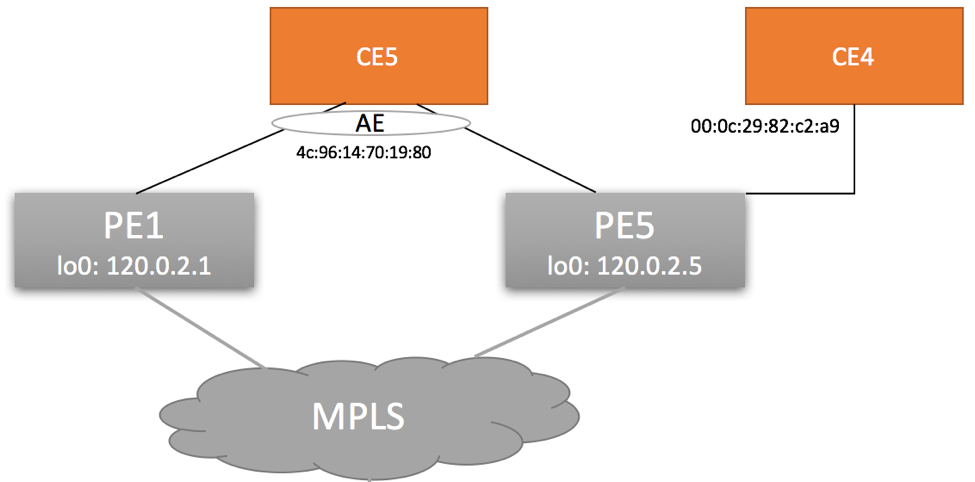Ethernet Segment Routes are needed in multi-homing scenario and used for Designated Forwarder Election. Designated Forwarder is responsible for sending broadcast, unknown multicast and multicast (BUM) traffic to the CE on a particular Ethernet Segment.
RFC 7432 allows selecting a DF at the granularity of <ES, VLAN> for VLAN-based service and <ES, VLAN bundle> for VLAN-aware service. This enables load-balancing of BUM traffic at a VLAN or VLAN-bundle level.
Please refer to the following cheat sheet if you are not familiar with EVPN Terminology.
The format of Type 4 advertisement is as follows:

Let’s review Type 4 advertisements originated by PE5 in the following example:

The following Wireshark capture demonstrates PE5’s advertisement of Type 4 route:
Path Attribute - MP_REACH_NLRI Flags: 0x90, Optional, Length: Optional, Non-transitive, Complete, Extended Length 1... .... = Optional: Optional .0.. .... = Transitive: Non-transitive ..0. .... = Partial: Complete ...1 .... = Length: Extended length Type Code: MP_REACH_NLRI (14) Length: 34 Address family identifier (AFI): Layer-2 VPN (25) Subsequent address family identifier (SAFI): EVPN (70) Next hop network address (4 bytes) Number of Subnetwork points of attachment (SNPA): 0 Network layer reachability information (25 bytes) EVPN NLRI: Ethernet Segment Route AFI: Ethernet Segment Route (4) Length: 23 Route Distinguisher: 0001780002050000 (120.0.2.5:0) ESI: 00 00 00 00 00 10 00 00 05 ESI Type: ESI 9 bytes value (0) ESI 9 bytes value: 00 00 00 00 00 10 00 00 05 IP Address Length: 32 IPv4 address: 120.0.2.5
Advertised Type 4 route as observed on PE5:
* 4:120.0.2.5:0::10000005:120.0.2.5/304 ES (1 entry, 1 announced) BGP group IBGP-RR type Internal Route Distinguisher: 120.0.2.5:0 Nexthop: Self Flags: Nexthop Change Localpref: 100 AS path: [100] I Communities: es-import-target:0-0-0-0-0-10
Control Plane Wireshark capture can be downloaded from GitHub:
For more information on EVPN, please refer to our other articles on this topic:
